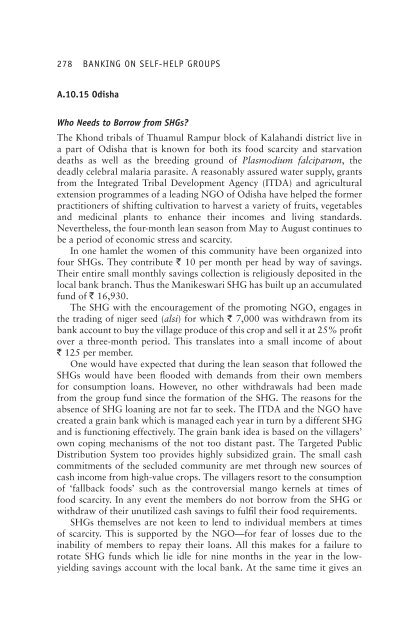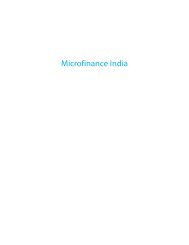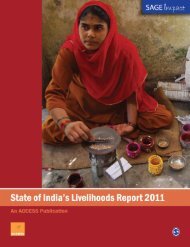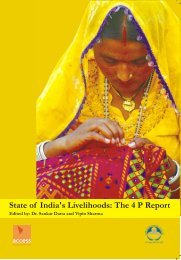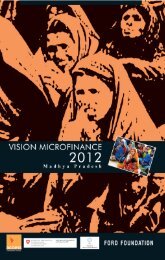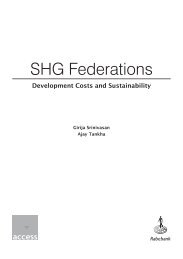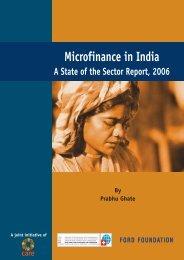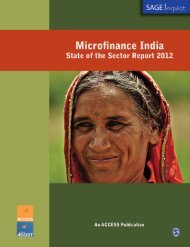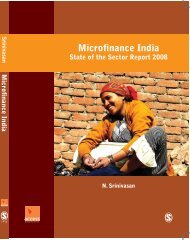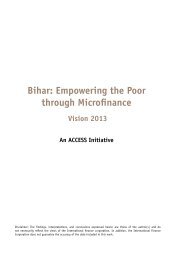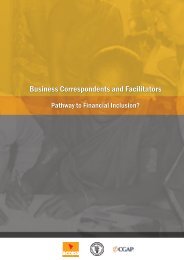Banking on SHGs - Nabard
Banking on SHGs - Nabard
Banking on SHGs - Nabard
- No tags were found...
You also want an ePaper? Increase the reach of your titles
YUMPU automatically turns print PDFs into web optimized ePapers that Google loves.
278 <str<strong>on</strong>g>Banking</str<strong>on</strong>g> <strong>on</strong> Self-Help GroupsA.10.15 OdishaWho Needs to Borrow from <strong>SHGs</strong>?The Kh<strong>on</strong>d tribals of Thuamul Rampur block of Kalahandi district live ina part of Odisha that is known for both its food scarcity and starvati<strong>on</strong>deaths as well as the breeding ground of Plasmodium falciparum, thedeadly celebral malaria parasite. A reas<strong>on</strong>ably assured water supply, grantsfrom the Integrated Tribal Development Agency (ITDA) and agriculturalextensi<strong>on</strong> programmes of a leading NGO of Odisha have helped the formerpractiti<strong>on</strong>ers of shifting cultivati<strong>on</strong> to harvest a variety of fruits, vegetablesand medicinal plants to enhance their incomes and living standards.Nevertheless, the four-m<strong>on</strong>th lean seas<strong>on</strong> from May to August c<strong>on</strong>tinues tobe a period of ec<strong>on</strong>omic stress and scarcity.In <strong>on</strong>e hamlet the women of this community have been organized intofour <strong>SHGs</strong>. They c<strong>on</strong>tribute ` 10 per m<strong>on</strong>th per head by way of savings.Their entire small m<strong>on</strong>thly savings collecti<strong>on</strong> is religiously deposited in thelocal bank branch. Thus the Manikeswari SHG has built up an accumulatedfund of ` 16,930.The SHG with the encouragement of the promoting NGO, engages inthe trading of niger seed (alsi) for which ` 7,000 was withdrawn from itsbank account to buy the village produce of this crop and sell it at 25% profitover a three-m<strong>on</strong>th period. This translates into a small income of about` 125 per member.One would have expected that during the lean seas<strong>on</strong> that followed the<strong>SHGs</strong> would have been flooded with demands from their own membersfor c<strong>on</strong>sumpti<strong>on</strong> loans. However, no other withdrawals had been madefrom the group fund since the formati<strong>on</strong> of the SHG. The reas<strong>on</strong>s for theabsence of SHG loaning are not far to seek. The ITDA and the NGO havecreated a grain bank which is managed each year in turn by a different SHGand is functi<strong>on</strong>ing effectively. The grain bank idea is based <strong>on</strong> the villagers’own coping mechanisms of the not too distant past. The Targeted PublicDistributi<strong>on</strong> System too provides highly subsidized grain. The small cashcommitments of the secluded community are met through new sources ofcash income from high-value crops. The villagers resort to the c<strong>on</strong>sumpti<strong>on</strong>of ‘fallback foods’ such as the c<strong>on</strong>troversial mango kernels at times offood scarcity. In any event the members do not borrow from the SHG orwithdraw of their unutilized cash savings to fulfil their food requirements.<strong>SHGs</strong> themselves are not keen to lend to individual members at timesof scarcity. This is supported by the NGO—for fear of losses due to theinability of members to repay their loans. All this makes for a failure torotate SHG funds which lie idle for nine m<strong>on</strong>ths in the year in the lowyieldingsavings account with the local bank. At the same time it gives an


